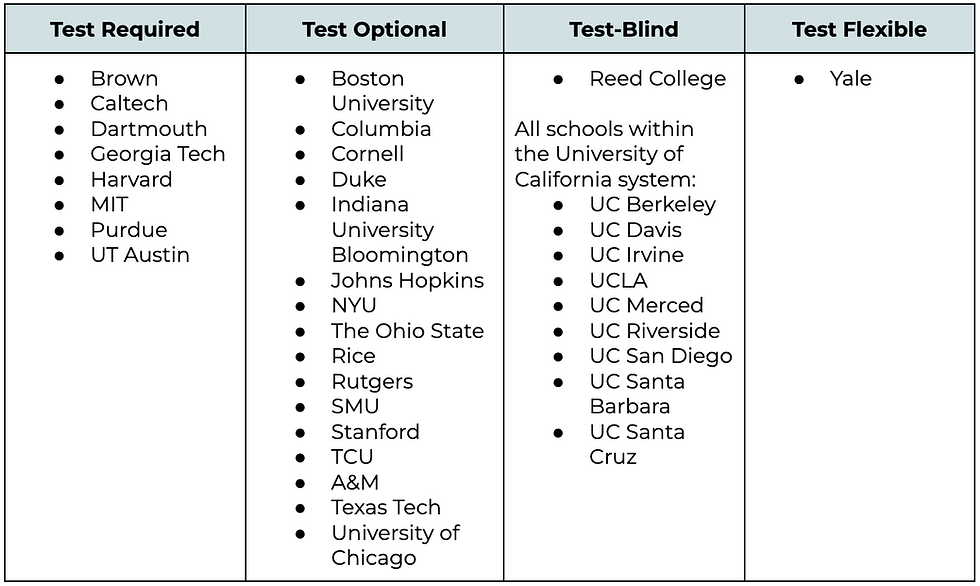The Return of Required Testing and What it Means for You
- Humberto Venancio
- Apr 18, 2024
- 3 min read
Updated: May 13, 2024

Ever since the COVID-19 pandemic, many U.S. institutions have adopted a test-optional policy in acknowledgement of the limited access to testing during this time. However, several colleges are beginning to reinstate required testing for the 2025-26 admissions season, and others have begun to take a more flexible approach to their standardized testing policies.
According to recent research, SAT and ACT scores act as a reliable indicator of a student’s undergraduate performance. UT Austin’s President Jay Hartzell stated that an SAT or ACT score can help differentiate between students with similar GPAs and often correlates with better academic performance (concerning first semester GPA).
Standardized testing also allows schools to accept more students from diverse backgrounds and with varying amounts of educational opportunities. Plenty of schools have insisted that test scores can assist in identifying high-achieving applicants from a variety of socio-economic backgrounds. For example, Dartmouth stated that contextualized testing is essential even as they assured that they “will never reduce any student to their test scores.” MIT, Purdue, and many other schools that lifted their test-optional policies echo these sentiments.
Understanding Different Types of Testing Policies
Test required: a submission of an SAT or ACT score is required for all undergraduate applications and will be considered alongside other materials.
Test optional: a submission of an SAT or ACT score is optional for all undergraduate applications. It is important to note that even when scores are optional, a strong SAT/ACT score can improve a student's overall application profile and many accepted students elect to submit their scores for holistic review. For example, during last year's admission cycle, 49% of auto-admit applicants opted to submit their SAT/ACT scores to UT Austin.
Test-blind: a submission of an SAT or ACT score will not be considered, with other materials being determining factors instead.
*The University of California is known for this policy. However, some institutions that are test-free for admissions may consider standardized test scores for course placement.
Test flexible: a submission of test scores is required, but the list of acceptable tests is more flexible than other schools. In the case of Yale, their list of tests that fulfill the requirement will expand to include AP and IB exams in addition to the SAT and ACT.
*Keep in mind that if students elect to send their AP or IB scores to Yale, they must send all AP/IB scores rather than self-reporting their strongest scores.
With these changes in mind, the table below lists the current testing policies of some of B2A students’ most popular colleges. Keep in mind that schools may update these policies in the coming months (Harvard recently announced its decision to return to required testing):

What this Means for YOU
While these decisions may seem daunting, remember that testing is just one of many factors that colleges will take into consideration. That being said, you should still set a goal score based on your colleges’ expectations and create a study plan to increase your chances of admission. Even if you are a strong student, standardized testing demands an entirely unique skill set. Any knowledge and practice you can gain will be helpful, especially with the recent changes to the SAT.
Another way you can prepare is by researching your top choice schools before testing. The middle 50% range of scores for the most recent school year demonstrate the scores of recently accepted students. You can use this information to set informed and realistic goals. You should also know if your schools allow for superscoring—where students can send their highest section scores from different attempts. However, B2A recommends submitting their highest test score from a single sitting whenever possible.
For an individualized college admissions strategy, reach out to B2A to schedule a 1:1 meeting. B2A’s test prep programs are designed to help you study effectively and achieve success in a number of formats, including the SAT, ACT, and AP or IB exams.
B2A also offers College Admissions Service (CAS) hours for application assistance and the Gateway Program, an all-inclusive college admissions counseling program designed to help students complete 5 applications.



























